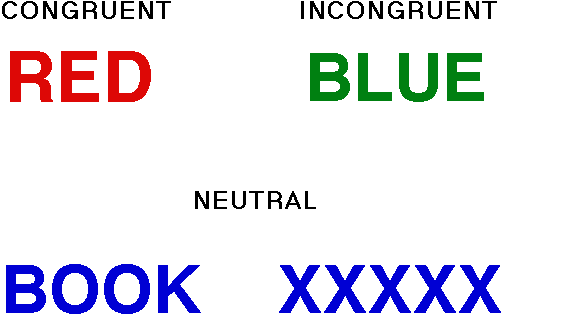
<<Back to Overhead Summary Page
<<Back to Cognition Class Home Page
---------------------------------------------------------------------------------------OUTLINE
* EXPERIMENT ON THE STROOP TASK AND GROUP DISCUSSION
* NORMAN AND SHALLICE MODEL OF GOAL-ORIENTED BEHAVIOR
* MODELS OF ATTENTION
* BRAIN NETWORKS OF SELECTIVE ATTENTION
----------------------------------------------------------------
THE TASK:
NAME THE COLOR IN WHICH EACH WORD IS WRITTEN (DO NOT READ THE WORD!!)
RED
BLUE
YELLOW
RED
GREEN
YELLOW
GREEN
BLUE
RED
YELLOW
RED
LIST B
YELLOW
RED
GREEN
BLUE
GREEN
RED
YELLOW
BLUE
RED
GREEN
BLUE
LIST C
BOOK
PEN
HOUSE
CHILD
PHONE
CUP
HOUSE
BOOK
CUP
PHONE
CHILD
1) How do the three lists differ? Which one is the most difficult? Which one is the easiest?
2) Which codes do you think are activated in this task?
3) Why do you think one of the lists is more difficult than the others? Can you list the mental operations that are likely to be performed in this task?
STROOP CONDITIONS

TWO ASPECTS OF THE STROOP TASK
1) AUTOMATIC VS CONTROLLED PROCESSES
Two processes are engaged in the Stroop task:
A) COLOR NAMING.B) WORD READING.
2) RESOLUTION OF A CONFLICT
---------------------------------------
NORMAN AND SHALLICE'S MODEL
TWO COMPONENTS:
1) CONTENTION SCHEDULING
2) SUPERVISORY ATTENTIONAL SYSTEM (SAS)
Situations that:
1) require planning or decision making2) require error correction or troubleshooting 3) require to create novel and not well learned links between the input and the action to execute 4) are difficult or dangerous 5) require a response that competes with a strong habitual response
---------------------------------------------------------------------------------------